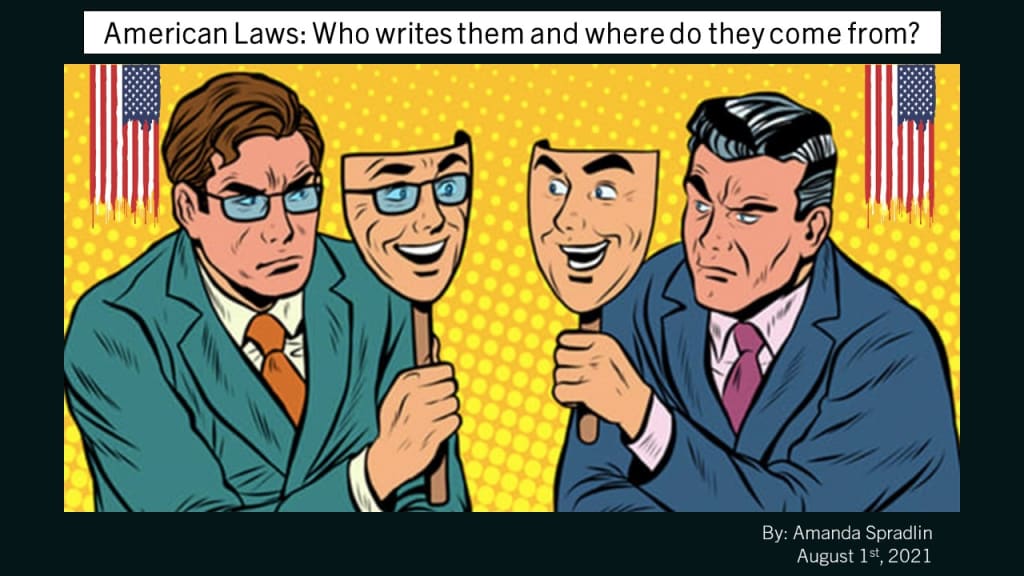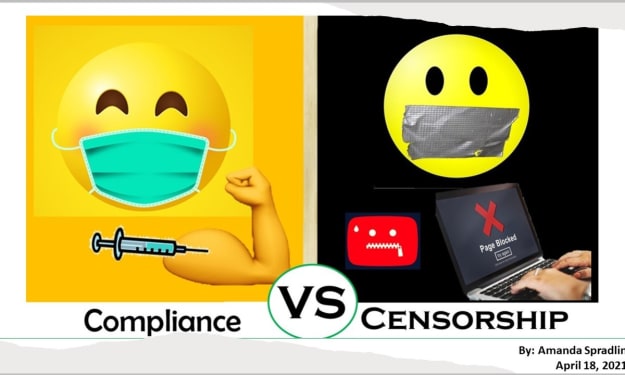Liberty Lost in Laws
A story of lazy legislators and crazy capitalists

More often than not, the lawmakers of America do not write the laws themselves. An investigation performed by USA Today found that between 2010-2018, over 2,100 model bills have been passed into law. A model bill is a bill that is originally drafted by lobbyists, and then copied and pasted by an elected official who continues to formally propose it to Congress. These are also known as fill-in-the-blank bills, as most go on to get copied over and over again, in a fill-in-the-blank format, to be reintroduced by several states (Bottari, 2015).
Fill-in-the-blank forms are useful for recording common and repetitive information. Think of job applications, emergency contact forms, surveys, and questionnaires. However, fill-in-the-blank forms are not sufficient enough to adequately address the complexity of American legislation or the variation of laws from state to state. So, how have so many of these model bills actually become laws? In this article, I am going to explain how they get pushed through the system and adopted into law without drawing the attention of many Americans.
The American Legislative Exchange Council is a self-proclaimed, “voluntary membership organization” of lobbyists with large pockets. In reality, it is a soupy gang of slick politicians, stake holding special interest groups, and economic big shot industries (Graves, 2011). The membership status and hierarchy of each member is determined by how much money they donate to the Council annually. In exchange, the ALEC lobbies on behalf of its members and performs all the legwork required to draft a proper bill for introduction to Congress. They even hold their own in-house vote on potential bills, before proceeding to submit them for official consideration.
Of the more than 2,100 bills that were signed into law between 2010-2018, over 1,100 of them stemmed from industries, which means they came from big companies and private corporations. The Center for Media and Democracy launched a project to expose the backdoor dealings of the ALEC over a decade ago. The most recent information can be found here. Since the project was unveiled, many well-known companies have cut ties with the ALEC amidst public relations backlash. However, many of the vacancies were filled by representatives of one of the most influential private stakeholders in the world, Koch Industries, Inc.
Koch Industries, Inc. is one of the most toxic polluters in the world, both environmentally and politically. The corporation has been in the public eye throughout history as the focus of many federal investigations, incurring several indictments and convictions, and for paying enormous amounts in fines and penalties due to their unlawful and hazardous business practices. Politically, Koch Industries is known for being a cash cow of influence that feeds the ALEC and infiltrates political campaigns through large donations on all party sides, according to its specific desires at the time (Gibson, 2019). For nearly 100 years, the Koch empire has been behind the curtains, guiding the progress of humanity in whichever direction it wants, by plumping up our political system with cash in support of its special interests.

The Koch empire began in the mid-1920’s. Fred Koch was an MIT grad, who copycatted the technology invented by Universal Oil Products used to break down crude oil and refine it into usable gas (Dickinson, 2014). He teamed up with a disgruntled former Universal employee and recreated the tooling, only making slight, unpatentable changes to the original invention. This was the beginning of the Winkler-Koch Engineering Co., and they began acquiring contracts by charging only a one-time fee to its buyers, instead of ongoing royalties that were charged by Universal in comparison. This soon proved to put Universal in a pretty unprofitable pickle, and as it continued to lose more and more contracts it sued for infringement of intellectual property in 1929. While facing litigation, Winkler-Koch could not do business within the United States. So, they set their sights abroad and made a deal with Stalin and the Soviets.
Despite Stalin’s totalitarian and communist agenda, Koch, who identified as a libertarian, sold 15 units to the Soviet’s, even going so far as to travel there and teach them how to build more on their own. This act would go on to pay legal fees for Winkler-Koch back in the U.S., as their court battle over infringement would continue over the next two decades. In 1934, the Supreme Court ruled that Winkler-Koch had in fact infringed upon Universal’s intellectual property. However, that decision was later overturned in 1943, when it came out that Universal had paid off the judge involved in the case to decide in their favor. In 1951, Fred Koch countersued Universal alleging antitrust violations and he received a settlement in the amount of $1.5 million in 1952.
The 1960’s saw the passing of Fred Koch and ushered in his son Charles as CEO of what is now known as Koch Industries, Inc. For decades to follow, the Koch history is a rollercoaster ride of fraud, theft, negligence, environmental safety violations, legislative lobbying, oil spills and leaks, and a whole lot of dirty money. The ultimate business philosophy for Koch Industries is “profits above everything.” They are not committed to abiding by any laws or accepting any kind of corporate social responsibility for their shady and hazardous business practices. Instead, their only goal is to make enough money to pay their way out of any legal trouble and still be ahead, continuing to generate more.

It would be accurate to say that they have far exceeded their goals. With a business presence in over 70 countries, Koch has long held a prominent position in the global market. This has directly affected the economy overall and has played a significant role in determining product pricing through supply and demand and foreign trade. Moreover, Koch Industries rakes in $115 billion annually, which allows them to afford the legal costs of a long list of violations and criminal activity, while also greatly funding and contributing to American politics. As recent as 2019, there were 69 members of the ALEC that were representatives of Koch Industries, not including the dozens of interns that they also place within the Council for even more strength in lobbying. In fact, the ALEC only still exists today because Koch Industries gave it a loan nearing half a million dollars in 1998 to save it from bankruptcy. Since then, it has given billions to the Council and various political campaigns, as it sees fit, in pursuit of its own goals.
As a privately held corporation, it also does not have to publicly disclose much of its financial records. Still, a look through SEC filings and Koch’s own newsroom press releases leads to even more questions. For example, there are Form D SEC filings submitted annually by Koch Industries which reflects the sale of equity securities. In March of 2020, their transaction consisted of 20 investors and reflects a sale amount of $52,932,800. A month later, in April 2020, according to Koch Newsroom, the conglomerate grew exponentially when it acquired global technology company, Infor. With the acquisition, Koch Industries gained even more global dominance and power, as Infor’s client list includes:
- The top 20 aerospace companies
- 9 of the top 10 high tech companies
- 14 of the 25 largest U.S. healthcare delivery networks
- 19 of the 20 largest U.S. cities
- 18 of the top 20 automotive suppliers
- 14 of the top 20 industrial distributors
- 13 of the top 20 global retailers
- 4 of the top 5 brewers
- 17 of the top 20 global banks
- 9 of the 10 largest global hotel brands
- 7 of the top 10 global luxury brands
The rapid growth of financial influence can also be observed in the Form D SEC filing in March of 2021, which reflects a total of 43 investors and a whopping sale amount of $383,363,640 in equity securities. Today, Koch’s reach has far extended beyond the oil and manufacturing industry and has found its way of having its say in every aspect of our lives, through its services, its products, its technology, and its fueling of political propaganda. More than half of American laws in the past decade have come from special interests via the ALEC and are funded by Koch Industries, Inc.
A study performed by the Carnegie Mellon Institute in 2016, shows that based on analysis of their speeches, most American politicians have reading and writing scores at grade school levels (Spice, 2016). This data raises several questions. How are they able to competently review proposed bills that are written by a group of individuals with master’s degrees? How do they research what each bill actually proposes and perform an objective assessment on the associated risks or possible consequences of each proposal? How do they review the applicable laws and consider what any revisions or amendments might do to their constituents, the American people, and the world at large? How have they allowed one single, private corporation to have so much control in our economy, in our politics, and around the globe? It is time to face the facts. Politicians in America are just paid puppets, putting on a public display to hide private dealings for profit. The real people who run the show, work for Koch.
References
Bottari, Mary. (2015 Mar 2). Full Koch Press for ALEC Right-to-Work Bill in Wisconsin.
Dickinson, Tim. (2014 Sept 24). Inside the Koch Brothers’ Toxic Empire.
Gibson, Connor. (2019 Sept 4). Koch Docs: How Charles Koch has Consumed ALEC.
Graves, Lisa. (2011 July 13). A CMD Special Report on ALEC's Funding and Spending.
Koch Newsroom. (2021) Koch Newsroom.
SEC.gov, Securities Exchange Commission Filings & Forms.
Spice, Byron. (2016 Mar 16). Most Presidential Candidates Speak at Grade 6-8 Level.
USA Today. (n.d.) Copy. Paste. Legislate.
About the Creator
Amanda Spradlin
Amanda Spradlin is the founder of Coincidental Chaos. She writes with the passion of a questionable mind. Any donations are appreciated!






Comments
There are no comments for this story
Be the first to respond and start the conversation.